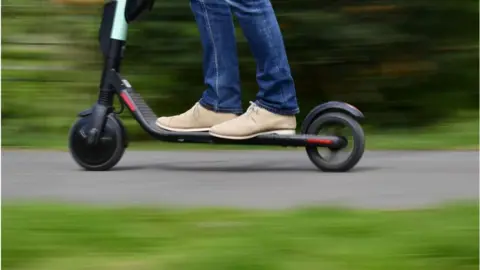How green and profitable are e-scooters?
 Getty Images
Getty ImagesExactly how green and how profitable are the electric bikes and scooters that millions of us are now renting?
Those were two of the big questions hanging over the industry as 2020 began.
Despite the huge disruption the pandemic brought, the biggest player in the market, Lime, now says it is profitable for the first time.
"There are some markets where we're hitting all-time high ridership," Lime chief executive Wayne Ting says.
Those include Seoul, London and Salt Lake City. For example, in London each vehicle is now being used an average of 4.5 times a day instead of about twice a day.
But there has also been some aggressive cost-cutting. As a privately-owned company, Lime won't disclose detailed numbers.
The year began with 14% of the workforce being cut - that's 100 jobs - and a retreat from 12 cities as the company ran short on cash.

Mr Ting says "it's been a tough year, certainly for Lime, but also for a lot of companies".
When the pandemic emerged in the spring, "we saw 95% declines in revenues" as country after country went into lockdown, he says.
That meant the rental service was paused for more than a month in the vast majority of the more than 120 cities where they operate.
However, as economies reopened, the recovery for Lime was "much faster and much more broad-base than we expected" says Mr Ting.
He thinks that was because for many people "one of the key questions was: 'How do I move around in a safe way?' And we have an open air, single passenger mode of transportation, and we saw lots of passengers taking another look at Lime".
Scooter jump
Data collected by Lime from Berlin, London and Paris shows a 15% increase in the number of electric bike and scooter trips, between pre-lockdown February and the warmer month June, when restrictions had been eased.
While some of the increase is seasonal, the distances travelled rose 68%, and by even more in areas with newly-installed bike lanes.
Justine Bornstein tracks the industry for the consultancy Deloitte, and says: "The various Covid-related lockdowns have been very good for the industry as a whole, but not for every company. There has definitely been an increase in the use of bikes and scooters".
"With much less car traffic on the street, people who had been put off for safety reasons were now trying out these new modes," she says.
Mr Ting believes the new customers will stick around, saying: "I think a lot of them are going to stay once this pandemic is over."
 Getty Images
Getty ImagesBut safety is a key concern for governments around the world, with worries about electric scooters even greater than those about electric bikes.
France has been a test case for these struggles. Last year it introduced new laws to cut the death rate and stop e-scooters being ridden on pavements or abandoned in the wrong places.
London and New York are among the major global cities considering those problems as they look at introducing e-scooters, after a recent surge in cycling.
Mr Ting says the pandemic has accelerated their plans. "Because of Covid, now they see the value."
UK view
In the UK, the law changed in the summer to allow rented e-scooters to be used on roads, but not pavements.
Parliament's Transport select committee recently called for that change to also apply to privately owned e-scooters.
However in an echo of the concerns of authorities in many parts of the world, a senior London policeman, chief superintendent Simon Ovens, this month said that e-scooters "remain notoriously dangerous", with concerns including riders not wearing helmets or having sufficient road awareness.
Mr Ting argues that his company's vehicles are intuitive and "you see roughly similar incident rates" to bicycles, although he concedes "it's still too high [and we] want to get it better than that".
That is why he says Lime has online tutorials about safe usage and has given away more than 100,000 helmets globally.
Lime green?
Another big concern that he wants to address is the environmental impact of e-scooters.
The International Energy Agency says 24% of carbon emissions come from transport, and last year, a study from North Carolina State University found that over their lifetime, e-scooters produce more emissions per passenger mile than buses.
Mr Ting says his firm's latest generation of e-scooters mean that is no longer true because they have longer life spans.
He wants to get people out of their cars and says "the average scooter or e-bike ride is less than 5% of the carbon footprint of a car ride". But he adds: "We've got to bring that number down".
Vehicles such as e-bikes and scooters are important "if we're going to be serious at tackling the transportation impact of the climate crisis," Mr Ting says.
For investment analyst Dan Ives at Wedbush Securities, Lime's e-scooters are an important innovation.
He says: "It's a fragmented space and competitors such as Bird and Voi among others have impressive business models."
But he says Lime's technology, brand, and strategic vision have been the winning bets.
The challenge, he says, will be retaining customers amid renewed competition from buses and trains in a post-Covid world.
You can watch Wayne Ting's full interview on "Talking Business with Aaron Heslehurst" this weekend on BBC World News.
